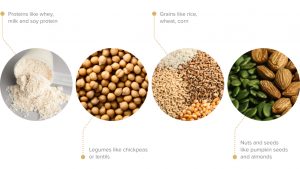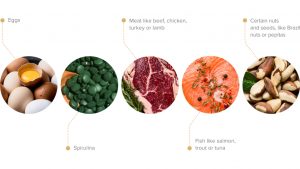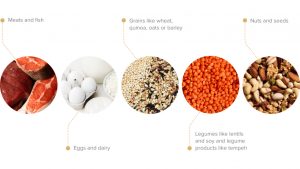Have you ever heard of amino acids? Whether you’re an athlete or a fitness fan, you’ve likely heard someone mention them. Whether in the context of protein powder or supplements, amino acids are critical compounds for our body. They are mainly used to make protein, but they also have a range of independent functions. If you’re keen to explore the world of amino acids and find out their benefits, jump on board!
What are amino acids?
The term amino acid probably means different things for different people. Many athletes or people with an active lifestyle might think they’re a helpful supplement or something needed to grow muscle. From a biological standpoint, amino acids are the single-unit parts of a protein.
Our body is made from over 100,000 proteins, all unique in structure. To make them, we use 20 amino acids. By relying on instructions from our DNA, these blocks unite into a long chain, called a polypeptide. The chains then fold into specific shapes; cellular machinery can further edit them to make the final protein.
The amino acids have specific properties, which are determined by their composition. The structure of amino acids is quite simple. All amino acids have an amino and an acid group. These groups can react to make a peptide bond, which holds together the polypeptide chain. Alongside these groups is a unique “tail” called an R-group. The chemical makeup of this group dictates what properties the amino acid has. These properties are fundamental for protein structure and the amino acids’ function.
But enough science. What do amino acids do in the body?
- They make up proteins, which include parts of the body like muscles, our hormones and even some neurotransmitters that send signals within the brain.
- Other than making proteins, they participate in our metabolism. We can use them to produce energy when we’re low on glucose.
- They support immune function.
A specific group of amino acids- the essential amino acids- is key for the body.
The role of essential amino acids in the body
Essential amino acids are the amino acids we need to maintain normal protein synthesis. That’s because if we’re getting enough of them daily, the body can make other amino acids from the essential ones or from other sources. Therefore, they support processes including protein synthesis, neurotransmitter production, hormone production, and even muscle growth.
Types of amino acids
We can classify amino acids in a few different ways. All amino acids have distinct properties – some of them are charged, some of them are not. Some contain rings or sulfur as part of their R-chain. However, classifying them by chemical properties probably won’t be useful unless you’re a scientist. For most people, another way of grouping amino acids is more practical. Some amino acids are essential, and some are non-essential. Essential amino acids are those we can’t make on our own and need to obtain from our diet. Non-essential amino acids are those we can make.
There is a small group of amino acids that are called conditionally essential. The body typically makes these amino acids in sufficient quantities. However, when we’re working out really hard or when we’re sick, the body can’t cope with the demand. Therefore, we need to get more of them from our foods in those moments. These amino acids are arginine and glycine.
Essential amino acids
There are nine essential amino acids in total. They have different roles and properties in the body. In this section, we’ll explore them further.
BCAA
The BCAAs are a group of essential amino acids that are quite popular with athletes. The three amino acids that make them up are leucine, valine, and isoleucine. They are best known for their role in building muscle. However, they do have other functions.
Leucine is excellent at activating the mTOR pathway. This specific signalling pathway turns on protein synthesis, cell growth, and many other cellular processes. In our post about how muscle grows, we explore this pathway in more depth. In addition, leucine promotes the process of secreting insulin when carbs are low. Its ability to influence insulin secretion may assist in improving insulin sensitivity and supporting heart health.
BCAAs, as a complex, benefit people and athletes in a few different ways:
- They can regulate fat metabolism by reducing the amount of fat the body stores
- They may support athletic performance, as they have been suggested to support recovery, fight tiredness and improve muscle damage through exercise.
- They may support muscle building. However, they may not be as effective as supplements containing all essential amino acids.
BCAAs are really easy to find in food. Good food sources include:
BCAAs are also often found as supplements. You can incorporate them into your routine easily by adding them to your pre-workout drinks or post-workout snacks. Learn more about using BCAAs in our blog post.
Lysine
Lysine is another amino acid that we must obtain from foods. The amino acid’s functions include:
- Supporting immunity, especially viral defences. Lysine can compete with another amino acid, arginine, which some viruses depend on. This can help our body’s defences against certain viral infections.
- Improving our ability to absorb calcium. It can help the body take up calcium and not excrete it with urine. This can be useful for supporting bone health.
- It may support good mental health through calming effects during stress. Lysine is required to make certain neurotransmitters, including those that play a role in nervous behavior. Therefore, lysine can support the body in times of nervousness or stress.
- It can improve healing by boosting collagen production. Our body’s most common protein is collagen. The body needs certain amino acids, like lysine and proline, to make it. Collagen synthesis is key for wound healing. Lysine can, therefore, support collagen production and wound healing.
Lysine can be found in many foods. However, some foods, like grains, are pretty low in it. Great sources of this amino acid include meat like chicken or lamb. Fish and seafood, such as prawns, are also rich in lysine. You can find this amino acid in legumes, such as chickpeas and kidney beans. Dairy and nuts are also excellent sources of the amino acid.
Tryptophan
Tryptophan is another essential amino acid. This amino acid has roles in brain function. When we eat it, it can be used to make a lot of different neurotransmitters, like serotonin, melatonin, and even a vitamin – niacin. It can help keep our brain sharp as we age and support sleep and our mood. In addition, the amino acid supports heart and metabolic health.
Tryptophan can be found in plenty of foods. Legumes and legume products like tofu are a great option, as are fish and seafood. Meats, dairy and grains like oats or quinoa can also be fantastic amino acid sources.
Methionine
Methionine is an amino acid that supports our immune system. Our body has T helper cells, which help the immune system fight off infections. These cells depend on methionine to make useful proteins and make more of themselves. It is also essential in attenuating oxidative stress, which supports healthy ageing. In addition, it is the amino acid that kicks off the manufacturing of protein.
We can find this amino acid in foods like:
Phenylalanine
Phenylalanine also supports the nervous system, as it helps make certain neurotransmitters. It can sustain motivation, focus and mood, which is why it’s becoming a popular nootropic. It is needed to make melanin, supporting skin health and protecting it from UV. In addition, it can promote satiety, helping those trying to lose weight, as it helps make hormones that signal that you’re full.
We can find phenylalanine in many foods:
Threonine
Threonine is an important amino acid for many structural proteins. It is made up of proteins like collagen and elastin. We need them to support skin and connective tissue structures, like joints. In addition, it’s necessary for the body to process fats and for our immune system to function.
You can find threonine in typical protein sources, like meat or fish. But foods like cottage cheese and wheat germ are also good sources of the amino acid. Many collagen supplements will also contain threonine, as it makes up the protein.
The essential amino acids can primarily be obtained from foods. Many of the amino acids in protein sources you already eat are essential. However, you might want to supplement the amino acids in certain situations. If that’s the case, there are a few options for you:
- Consider a protein supplement. If you’re trying to supplement all of the essential amino acids, a great way to do so is through a protein supplement. It will usually contain essential and non-essential amino acids. Whey protein powders, like Maxler Golden 7, will include a large amount of essential amino acids, as will most vegan protein powders.
- Consider a specific amino acid supplement. Sometimes, you’re trying to get a particular amino acid’s benefit. In that case, a good option is an amino acid supplement. For example, many athletes tend to take BCAAs on their own. Maxler 100% Golden BCAA is an excellent example of a high-quality BCAA supplement that is easy to take on the go.
- Consider an amino acid blend. An amino acid blend might be a good solution if you’d like to get the benefits of amino acids that the body can quickly absorb. The blends are usually liquid and will be digested quicker than a protein supplement. They can also contain additional beneficial ingredients to support your training.
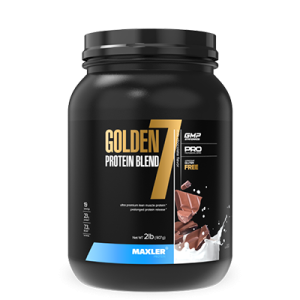
Golden 7 Protein Blend
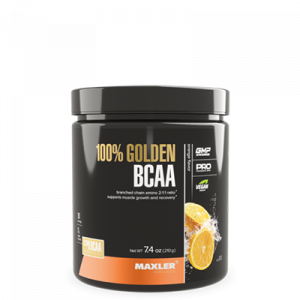
100% Golden BCAA
Essential amino acids are crucial for our muscle-building process. In addition, each essential amino acid has its particular function. The amino acids allow us to reach our full potential when it comes to shaping, muscle building, and other goals. Therefore, understanding how to use them and their benefits can help you optimize your supplementation regimen. Knowledge is power and can bring you one step closer to your goals. Start the journey to your best self!




